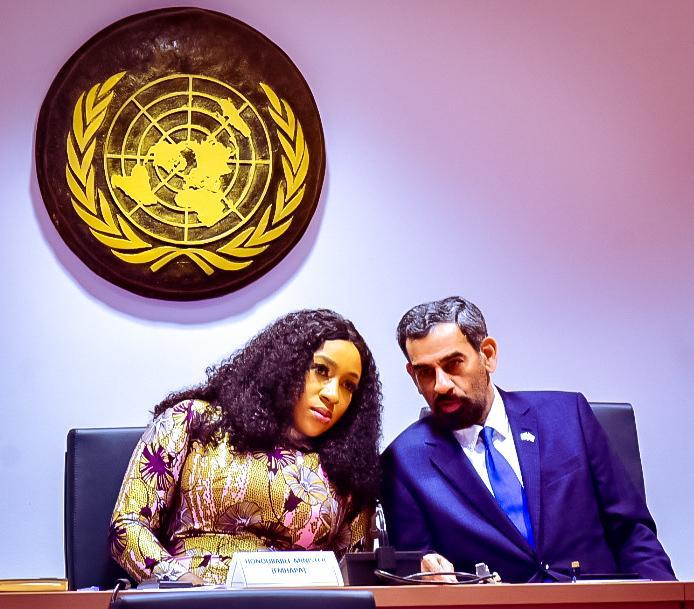…To Raise $5 Billion Annually For Nigeria’s Humanitarian and Poverty Alleviation Trust Fund
It was the first humanitarian coordination meeting in Nigeria in recent times which featured a heart-to-heart frank discussion at the United Nations House, Abuja Tuesday as Nigeria’s Minister For Humanitarian Affairs and Poverty Alleviation, Dr Betta Edu engaged Ambassadors, UN agencies, Development Partners, INGOs and NGOs on their Commitment to Humanitarian crises in Nigeria.
The meeting, which was at the instance of the Minister, brought all the humanitarian responders in Nigeria under one roof, where they all committed to a durable, smart, and coordinated approach to humanitarian response.
Part of the resolutions of the meeting, was the commitment to raise $5 billion annually for Humanitarian Affairs and Poverty Alleviation Trust Fund in Nigeria by the federal government, other countries, private sector, donor agencies and the Development Partners. The hosting of the African Humanitarian summit, which is a follow-up to the World Humanitarian Summit of Istanbul in 2016, joint field assessment by government and partners. Quarterly humanitarian coordination meeting and Nigerian humanitarian report, creation of the Nigeria Humanitarian Dashboard amongst others.
Dr. Edu conveyed President Bola Tinubu’s appreciation to UN agencies and development partners for their immense contributions to easing humanitarian challenges in Nigeria. She, however, stressed that the era of uncoordinated, unaccountable, and silotic approaches to humanitarian response in Nigeria was over.
“President Bola Ahmed Tinubu does appreciate the effort of the UN agencies as well as other organizations that are working in the humanitarian space. but we just need to bring this effort in a more coordinated manner so that we can achieve more, especially in the face of dwindling resources.
“There is a need for the government to take the lead and properly coordinate.The days of uncoordinated responses to the humanitarian crisis in Nigeria should be over.
“The days of operating in silos and duplicating efforts that lead to wastage amongst other things should be over. The government must take the lead to coordinate, to ensure that we are first in line with government priorities, and then secondly, we are meeting our targets.”Plan with government, implement with government, and let’s get the right results in the right direction.
“Government will follow up. The government will be proactive, and the government will monitor because we want to see results. Like I told you, We signed a bond, so that bond, we will deliver on it together as a team. Yes, we will,” the minister said.
She emphasized the federal government’s commitment to reduce, prevent, mitigate, and respond adequately to the humanitarian crisis in Nigeria in a more coordinated manner, thereby reducing poverty by 50 per cent.
On his part, United Nations Resident and Humanitarian Coordinator for Nigeria, Matthias Schmale who spoke on behalf of UN agencies expressed absolute support to the government of Nigeria in its effort to tackle humanitarian challenges facing the country and commended Dr.Edu for providing dynamic leadership in that regard.
“We’ve heard very clearly from you, honourable Minister, that humanitarian needs of course span the rest of the country.We are here as United Nations Agencies to support in ensuring proper coordination, develop review and implementation response plan, mobilise resources for country response as well as align to Federal Government priorities.
The UN chief was optimistic that the “Renewed Hope Agenda of the government is leading the way forward in terms of Nigeria being able to deliver on the SDGS, and address humanitarian needs.”
The Ambassadors of Malaysia, Norway and United Arab Emirates, amongst other Ambassadors present, committed to supporting Nigeria in a more strategic way to address humanitarian crisis.
